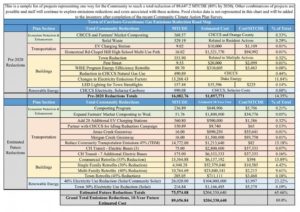Last night, the Carrboro Town Council voted to approve financing for the 203 Project, aka the new library in Carrboro. The vote was 5-1, with the lone dissenting vote coming from Sammy Slade.
In a letter to the Daily Tar Heel, Slade outlined his reasons for voting against the project. The opening paragraphs of his letter state his argument clearly:
On climate emergency action, we have set a climate justice goal for doing our part: an 80 percent reduction of per capita greenhouse gas emissions by 2030.
Yet, voters have failed to elect majorities in any level of government that are serious about climate emergency action — or willing to allocate sufficient funds for doing their part for taking action within the closing 10-year window for emergency climate action that we may still have.
If one believes that we are in a climate emergency, why wouldn’t we follow Slade’s advice and spend every last penny on addressing it? Why would we invest in a library when Carrboro is in a position to save the planet?
Leaving aside the obvious response that Carrboro, for all its wonders, does not have enough sway to enact meaningful change at even the regional level (The town’s ~20,000 residents make up just three percent of the Durham-Chapel Hill MSA), Slade’s focus on spending money on climate action implies that Carrboro has a workable plan at hand. In a Facebook group, Slade provided a list of his spending priorities:

This list of priorities comes from Carrboro’s Energy and Climate Action plan, first produced in 2014 and last updated in 2020, and the Community Climate Action Plan, which was first produced in 2017 and also updated in 2020.
Of the $204 million Slade would like to spend, approximately half of it ($105 million) is on renewable energy (code for solar panels), while another $82 million is on retrofitting existing buildings. The remaining $17 million pays for some good things (a few electric buses, constructing greenways) and other things of questionable value (composting, EV charging stations).
The climate action plans make very few references to the single-biggest cause of pollution in North Carolina, transportation, and does very little to address it. Building walkable neighborhoods and reducing car use will do far more to address climate issues than anything on the town’s official list of climate-related priorities and, better yet, won’t require nearly as much money.
To his credit, Slade acknowledges the value of increasing density in Carrboro in his letter to the DTH. But he argues that we don’t have enough time to build our way out of this crisis:
While it is true that this building will contribute to the high-density mixed-use development that aligns better with a multimodal transportation system that is free from fossil fuels, the time necessary to displace the many decades worth of suburban built environment that we have painted ourselves into a corner with does not exist.
However, one just needs to look to Carrboro’s nearest neighbor, Chapel Hill, for an example of how much you can get done when you change land use. Since the form-based zoning district in Blue Hill was created by the Chapel Hill town council in 2014, 1,739 new apartments have been built or are currently under construction on just 97 acres of land. In downtown Carrboro, we could build something similar, but place restrictions on the development of parking downtown, reducing car dependency and attracting people who live and work in our community.
A more responsible climate action plan would focus squarely on car-centric culture. Cars, both electric and gas, contribute to urban sprawl, take up excessive space, and make our communities dirtier, more dangerous, and more expensive. With this new library, and the parking deck that was included to get county financing, Carrboro can begin the process of transitioning to a car-lite downtown, where residents and visitors alike park once, or don’t park at all, and experience all that our community has to offer.
